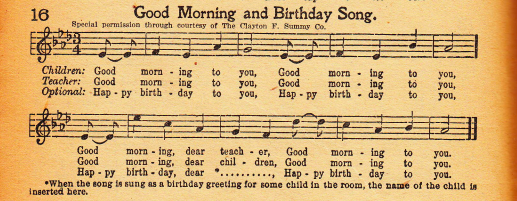
The public will soon be free to sing the world's most famous song.
Music publisher Warner/Chappell will no longer be allowed to collect licensing royalties on those who sing "Happy Birthday" in public and will pay back $14 million to those who have paid for licensing in the past, according to court settlement papers filed late Monday night.
The settlement is a result of a lawsuit originally filed in 2013 by filmmaker Jennifer Nelson, who challenged the "Happy Birthday" copyright. "Happy Birthday" has the same melody as "Good Morning to You," a children's song dating to the 19th Century. But despite the song's murky early history, music publisher Warner/Chappell has stuck to its story that the song was copyrighted in 1935, and a royalty had to be paid for any public use of it—until now.
The deal still needs to be approved by US District Judge George King, who is overseeing the case. King gave Nelson and other plaintiffs an interim victory in September when he ruled that the copyright transfer deal that Warner had relied on was invalid. In that decision, the judge added that in his view, it's questionable whether alleged author Patty Hill wrote the song at all.
Lawyers for the two sides told the judge in December that they had reached basic agreement over a settlement, but it took nearly two months for the details to be finalized and made public.
Warner/Chappell has been collecting an estimated $2 million annually from people who use the "Happy Birthday" song, mainly in creative works like movies and television shows. For makers of independent documentaries like Nelson, the several thousand dollars charged can be a significant expense. The makers of acclaimed 1990s documentary Hoop Dreams famously paid $5,000 to show a scene where the family of one of its main subjects sang the "Happy Birthday" song.
Culture shift
The $14 million will be paid to two distinct groups: those who paid a licensing fee to Warner/Chappell before 2009 and those who paid in 2009 or later. The earlier group is eligible to receive up to 15 percent of what they paid, whereas the later group is eligible for a full refund.
Nelson's lawyer Randall Newman, who spoke to Ars Monday night shortly after the settlement was finalized, said that the difference in payouts is related to the statute of limitations. The judge in the case allowed the complaint to address claims going back to 1949, but he "seemed skeptical" about certifying a class that large, Newman said.
"There’s a huge problem with the statute of limitations," Newman said. "We’re not sure [earlier claims] ever would have gotten a class certified, and they're not going to certify individual claims from 1952."
"It’s a pretty good deal," he added. "It's not one of these settlements where the attorneys get millions of dollars and the class gets a coupon for a free soda. These people are getting real money back. The most important part of the whole case was having the song in the public domain. You're going to see 'Happy Birthday' in movies, in TV, all over the place. It's a huge victory for artists and an important case in history."
Now that Newman has pioneered the strategy of using a class-action lawsuit to attack a bogus copyright, it's unlikely to be the last time copyright reformers hear his name.
"I think there are a few other songs that we're going to attempt to free up next," he told Ars. "I don't want to say the names."
reader comments
127